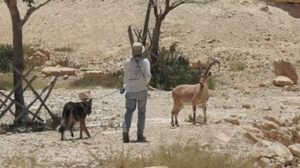
An “urbanized” Nubian Ibex in southern Israel tolerating close human approach. ADI EINAV, 2020
Human interaction has adverse effect on wild animals
Most wild animals have a full complement of behaviors to avoid predators and stay alive, such as vigilance, freezing or fleeing. However, an international group of researchers found that contact with humans caused a rapid loss of “antipredator traits.” The initial change in behavior is likely a demonstration of “behavioral flexibility.” However, if the contact continues over many generations, genetic changes may follow.
Researchers learned that wild animals’ responses to predators changed three times faster as a result of domestication (think wolves to dogs) than with urbanization (think eagles living in city woodlands). Captivity resulted in the slowest changes, which make sense. The fact that herbivores changed their behavior more rapidly than carnivores is interesting, because the carnivores would have a harder time finding a food source without human intervention. Solitary species tended to change quicker than animals that live in groups.
The researchers analyzed 173 peer-reviewed studies that looked at antipredator traits in 102 domesticated, captive, and urbanized animals, including birds, reptiles, and fish.
Losing these life-saving behaviors poses obvious risks for domesticated or urbanized species that encounter predators. Human caretakers must be thoughtful when handling captive animals, even those held for rehabilitation, if release back into the wild is intended.
It’s understandable why wild animal sanctuaries that plan to release animals back into their natural habitats must ensure that the animals do not become too comfortable in the environment that humans manage.
The fact that human contact with wild animals alters the animals behavior and causes genetic changes has important implications for conservation and urban planning.
Citation: http://journals.plos.org/plosbiology/article?id=10.1371/journal.pbio.3000818